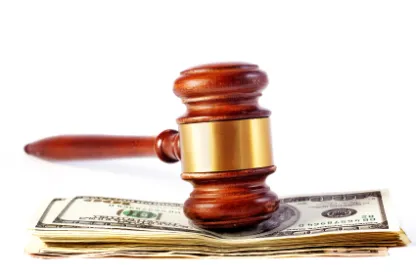Applicants who challenge in a federal district court a Trademark Trial and Appeal Board decision that upholds a PTO refusal to register a trademark may be required to reimburse the government for PTO attorney fees, even if they win.
In its April 23, 2015 decision in Shammas v. Focarino, the US Court of Appeals for the Fourth Circuit affirmed a district court decision holding that an applicant who appeals to a district court a decision by the Patent and Trademark Office (PTO) not to register a mark must pay all the PTO’s expenses for the appeal, including attorney fees. As we reported in January 2014, when the district court issued its decision, this was the first case to hold that a dissatisfied applicant must pay the PTO’s attorney fees regardless of the appeal’s outcome.
Background
Pursuant to 15 U.S.C. § 1071, a party who is dissatisfied with a decision by the Trademark Trial and Appeal Board (TTAB) may either take an appeal to the US Court of Appeals for the Federal Circuit or commence a civil action in a federal district court. If the applicant appeals to the Federal Circuit, the appeal is decided based on the record before the TTAB. However, if the applicant commences a civil action, the administrative record may be supplemented with new evidence. Pursuant to 15 U.S.C. § 1071(b)(3), if an applicant commences a civil action where there is no adverse party (e.g., an opposer to the application to register), then a copy of the complaint shall be served on the PTO director, and “unless the court finds the expenses to be unreasonable, all of the expenses of the proceeding shall be paid by the party bringing the case, whether the final decision is in favor of such party or not.” In Shammas, the Fourth Circuit addressed for the first time whether the PTO could recover attorney fees pursuant to this provision.
The Fourth Circuit’s Decision in Shammas
Mr. Shammas elected to appeal to the US District Court for the Eastern District of Virginia the TTAB’s decision upholding the PTO examiner’s determination that the mark PROBIOTIC was generic with respect to fertilizer or, alternatively, that the mark was descriptive and without secondary meaning. After the district court affirmed the TTAB’s decision, the PTO made the novel argument that it was entitled to recovery of more than $35,000 in attorney and paralegal wages. The district court held that the PTO was entitled to recovery of its attorney fees based on the requirement in 15 U.S.C. § 1071(b)(3) that the party bringing a case pay “all the expenses of the proceeding.
Mr. Shammas appealed to the Fourth Circuit, which has now affirmed the district court’s decision. A divided Fourth Circuit panel disagreed with Shammas’s argument that the absence of express language authorizing the payment of attorney fees by the appealing party was dispositive. A majority of the panel held that the American rule—which provides that a prevailing party may not recover attorney fees unless there is a clear statement in the statute that expressly authorizes the recovery of attorney fees—applies only when the award of attorney fees depends on whether the party seeking attorney fees prevails. In contrast, section 1071(b) mandates payment of attorney fees without regard to a party’s success and therefore does not operate against the backdrop of the American rule.
The court relied on the text of section 1071(b) (specifically, the use of the broad phrase “all expenses”) and the statute’s legislative history in concluding that the statute contemplates that applicants are responsible for paying the PTO’s attorney fees. The court concluded that the requirement that an applicant pay all PTO expenses was intended to reduce the financial burden on the PTO. Because district court actions under section 1071(b) allow parties to take additional discovery and introduce new evidence, the PTO faces higher costs in defending against these actions than it would in an appeal to the Federal Circuit.
Practical Implications of Shammas
Before Shammas, a dissatisfied applicant challenging a decision upholding a PTO refusal to register a trademark typically based the decision of whether to file an appeal in the Federal Circuit or commence a civil action in a district court on (i) whether the applicant wanted to supplement the record that was before the TTAB, (ii) whether there was any choice-of-law benefit to proceeding in the Federal Circuit versus in a district court in another circuit, and (iii) the likely increased expense associated with commencing a civil action that could involve supplemental evidence and discovery and the possibility of an appeal of the district court decision.
As we noted in our previous LawFlash about this case, in light of Shammas, applicants must now also consider the likelihood that they will have to pay the PTO’s legal expenses if they elect to commence a civil action, regardless of the appeal’s potential outcome.
In Shammas, the PTO’s legal expenses were approximately $35,000. In some cases, however, the PTO’s expenses may be higher for several reasons. First, the Shammas case was decided on summary judgment, so there were no legal expenses associated with trial preparation and trial. Second, the Shammas case was litigated in the “rocket docket” of the US District Court for the Eastern District of Virginia, and the expedited pace of pretrial proceedings in that court frequently limits the cost of pretrial proceedings. Finally, there appeared to be relatively limited efforts to supplement the TTAB record in Shammas. For all these reasons, the PTO could easily incur significantly higher legal expenses in many civil actions challenging a TTAB decision and—at least in the Fourth Circuit—an applicant will have to pay those expenses, regardless of the civil action’s outcome.
In addition, the Shammas decision may have the indirect effect of increasing efforts and costs in appeals of PTO examiners’ refusals to the TTAB. Refused applicants may find it necessary to develop complete records in their appeals to the TTAB rather than rely on more limited arguments. That way, if the TTAB affirms a refusal, an applicant may appeal the decision to the Federal Circuit with the benefit of a full record but without being obligated to pay the PTO’s attorney fees.



 />i
/>i

